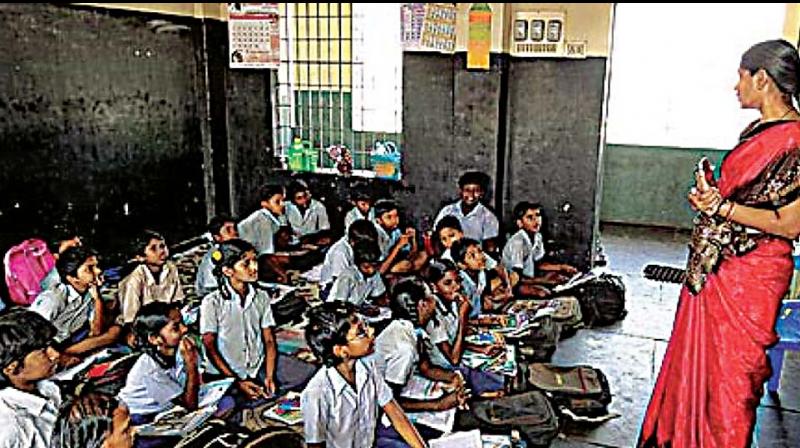Govt should spend more on education, says NITI Aayog

Bengaluru: Calling for major reforms in the education sector, NITI Aayog has advised the government to spend more on education and to conceptualise better plans of enforcement to ensure minimum quality of teachers.
In its report ‘Strategy for New India @ 75’ report, the Union government’s think-tank has also recommended that separate tracks for education should be set up according to the aptitude of students.
“Government spending on education as a whole (not just school education) should be increased to at least 6 per cent of GDP by 2022,” the report also points out that allocations to the education sector by the Centre and states, at present, remains close to 3 per cent of GDP, which is lesser than the world average (4.7 per cent of GDP, according to World Bank).
It called for a revamped governance system to improve monitoring and accountability of the education sector and urged state governments to develop and formulate robust mechanisms to enforce regulations on teacher qualifications, teacher absenteeism and learning outcomes.
Learning outcomes should be regularly assessed by bodies independent of the line ministries, the Aayog suggests. Provide ‘regular’ and ‘advanced’ lessons based on student aptitude.
Among major recommendations made by NITI Aayog, the proposal to develop a separate track even within the general education stream, as has been done in certain advanced countries.
It has been suggested that a specially devised aptitude test must be conducted in Class 9 and re-checked in Class 10, based on which students should be given the option of choosing a ‘regular’ track versus an ‘advanced’ track.
“These two tracks would differ in the difficulty level and choice of subjects. Those pursuing the ‘regular’ track should be given the option of completing the ‘advanced’ track syllabus through open schooling at a later point in life.”
Welcoming the “much-needed policy change”, President of Managements of Independent CBSE Schools Association (MICSA) M. Srinivasan said that such a choice would help students be confident and further their interests identifying their aptitude at a right age.
“While the vision of this proposal is commendable, a comprehensive way of implementing it across schools is now essential to make this a reality. Schools should have qualified and well-versed teachers to manage more complexities of each subject to match the advanced levels of education offered to each student then,” he said.
Exams for teachers too
To reiterate accountability and competency of teachers handling each subject, the report stresses that states should test teachers thrice per year on the same syllabus designed for their respective students. “The Teacher Eligibility Test (TET) across stats should be strengthened as per central TET by implementing standardization of results, quality benchmarking of testing-items and extending the TET for teachers at pre-school and of classes 9 to 12,” the report suggests. Reacting to this move, V.N. Rajashekhar of the Save Education Committee said the system has to be blamed instead. “Most teachers are given a huge workload of non-academic and clerical nature, apart from teaching, and this undoubtedly affects the quality of their performance. While most teachers from government schools are burdened with activities ranging from census collection to even preparing and distributing mid-day meals, there is hardly any time left for creative teaching. The lack of adequate number of teachers and proper infrastructure should be solved first with constant inspections held at schools to strengthen the academic infrastructure instead,” he said.

